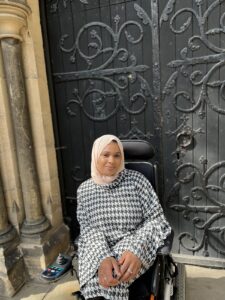
In recent years, the ‘Purple Pound’ movement has gained momentum, spotlighting the economic power of the Disabled community. This initiative emphasises the significant spending capacity of Disabled individuals and their families, estimated to exceed £274 billion in disposable income in the UK alone. This represents a substantial opportunity for businesses to enhance their reach and profitability by embracing accessibility, and Purple Tuesday on November 12th is the perfect opportunity for this.
Purple Tuesday is an opportunity for staff of organisations from all sectors to pledge to foster awareness, deepen understanding, and implement solutions for improved accessibility in their customer environments. By committing to improve accessibility initiatives, businesses demonstrate dedication to improving the experience of Disabled consumers. This is extremely important for increasing safe and inclusive experiences for the 1.3 billion Disabled people worldwide.
However, Disabled people often encounter barriers due to inaccessibility, which prevents them from accessing a building or business. I have frequently found that in my local area, cars are parked in a manner that blocks the dropped kerb, which means that I am expected to push my wheelchair on the road, and the stores in my local area have steps to enter. Therefore, I cannot independently choose what I would like. Situations like this make me feel ‘Disabled’ as the Social Model of Disability would rightly state that environmental factors disable me rather than my actual Disability. I am forced to travel further to stores that are step-free and accessible for my wheelchair, highlighting how businesses not embracing accessibility reduces their reach and profitability.
A 2021 study by the National Travel Survey highlighted that Disabled people travel significantly less on average than non-disabled people, with Disabled participants averaging 21 trips per year for entertainment and leisure, compared to 32 trips per year for non-disabled participants.
I love to travel; I love exploring new cities, from the coffee shops to the unique sightseeing spots on offer – but as a wheelchair user, I am very much aware of the levels of planning that this entails, from the transport to the access at each venue. Organisations that participate in ‘Purple Tuesday’ are dedicated to making public commitments each year to improve accessibility and practices, ensuring that Disabled customers have a more inclusive and positive experience. These commitments involve initiating at least one new activity or initiative.
In this article, I will share my journey of travelling from Leicester to Paris using Eurostar and I will highlight why embracing accessibility is excellent for both the company and the consumer. I will also highlight my experiences of the train journey from Leicester to London St Pancras station and then the trip on the Eurostar from London St Pancras station to Paris Gare du Nord station, one of the most straightforward and accessible journeys I have been on.
The first thing that stood out to me when booking tickets was that I could immediately inform the staff of my Disability when booking online. Disabled and companion tickets are £39.00 for a single ticket all year round, and we sat in first class. This is amazing as a wheelchair user, as I wanted to ensure that I travelled during off-peak season; this means that it will be less crowded and much more enjoyable if I am not trying to navigate through masses of tourists! After I had booked my Eurostar, it was time to book my train ticket from Leicester to London and my hotel in Paris.
The first part of my journey from Leicester to London was incredibly smooth. I requested my assistance using the Passenger Assistance App. This allowed me to exert control, in just a few taps I could alert staff of my access needs in advance, such as a ramp to get on the train, help carrying my luggage, a ramp, and a wheelchair space on the train. This was key to ensuring a safe and stress-free journey to London. There have been some occasions in the past where suitcases have been placed in the wheelchair space, which is super-inconvenient, but this time, the staff put the ramp out for me, and I was able to sit in the wheelchair space safely, with my friends on the seats next to me.
After a short journey, we arrived at London St Pancras train station, and I can only vouch for and praise the station’s accessibility. As I requested assistance in advance, this allowed ample time and opportunity to explore the stations’ amenities. It is honestly amazing. All the shops have step-free access, and various shopping options help you pass the time. We stopped at Joe and the Juice as we had heard great reviews, and the tunacado sandwich was excellent. I recommend it. Another thing I thought was amazing was the beautiful, spacious lounge where wheelchair users could rest whilst we awaited our Eurostar train. The lounge was slick with a dark interior and access to an accessible toilet fitted with hoists, lowered mirrors and a red cord that wasn’t tied to the wall!
Finally, it was time to check in and board our train. The entire process, from start to finish, was efficient and quick. The staff escorted me to the entrance door of the Eurostar, and they fitted a ramp so that I could easily get on the train. The Eurostar itself is extremely spacious and clean; there’s plenty of room to move around and an accessible toilet.
At St Pancras I had access to a lounge to rest and an accessible toilet, this eased the pressure of asking the stores at St Pancras if they had accessible toilets. Generally, businesses often don’t have an accessible toilet which makes outings stressful and if I’m lucky enough to come across an accessible toilet, I am often pressured to buy an item so that I can use it. In comparison to flying abroad, the Eurostar was an incredible mode of transport as I was able to remain in my wheelchair from start to finish, reducing my anxiety massively.
This experience highlights how journeys for wheelchair users can be so simple and straightforward when businesses consider the access needs of Disabled people and why initiatives such as Purple Tuesday are so important for businesses to adopt. Did you know, 75% of Disabled People and their families have walked away from businesses due to poor customer service or accessibility?
I used Transreport’s Passenger Assistance App to request my assistance from Leicester to St Pancras. The app was useful for the rail travel section of the journey, but it would be great if it was available for more transport modes like Eurostar. I informed the team of my Disability during the booking process but having the opportunity to request the assistance I require using the Passenger Assistance App would put my mind at rest knowing that my needs are acknowledged and processed so that in the event of an emergency e.g. in the event of a train cancellation my Disability would be considered and changes would be made accordingly. Unfortunately, I experienced this incident on a previous occasion when I used the Eurostar which is why I advocate for transparent and clear communication and using apps such as the Passenger Assistance App to ensure a smooth journey.
As more Disabled people share their accessibility stories, businesses are starting to recognise the importance of creating inclusive environments. Accessibility goes beyond compliance with regulations; it is about understanding and meeting the diverse needs of all customers. The Purple Tuesday website highlights some of the ways that businesses can commit to improving accessibility. For example, businesses can commit to a Digital Accessibility Audit, sign up to Purple 365 for Disability training for your whole organisation, introduce formalised quiet hours in your physical spaces, conduct an audit of your recruitment process and implement the Hidden Disabilities Sunflower Lanyard Scheme.
Disabled people have a range of needs and the best way to know how you may implement change positively is by simply speaking to us and hearing our views – there is nothing about us, without us.
About the Author

Umaymah Dakri, 23.
Disability awareness and accessibility advocate.
Disability.living on Instagram.